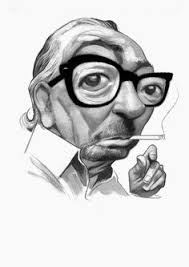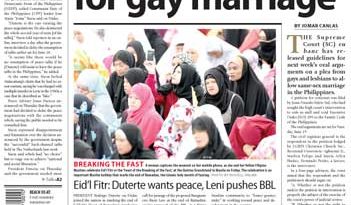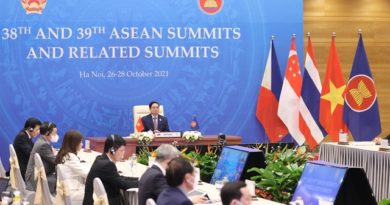MINDANAO, Philippines: Philippines’ war on drugs fuels attacks on land defenders – report
Photograph: Bullit Marquez/AP
.
.
President Rodrigo Duterte’s war on drugs and declaration of martial law in an island territory are being used as a pretext to attack people defending their land and environment in the Philippines, new research shows.
The resource-rich archipelago in south-east Asia is the world’s most murderous country for people who oppose logging, destructive mining and corrupt agribusiness. At least 30 people were killed in the Philippines last year, following 48 in 2017, dislodging Brazil from the top spot for the first time since the independent watchdog Global Witness began monitoring in 2012.
BELOW IS RESERVE FOR YOUR ADVERTISEMENT –

In Palawan, illegal logging is the dark side of the tourism boom as the island province rushes to construct hotels and resorts. At least 12 local environmentalists have been murdered since 2004, including Ruben Arzaga, the head of El Nido village, who was shot in September 2017 by illegal loggers.
Global Witness said the threat against defenders in Palawan has escalated with Duterte’s brutal campaign against illegal drugs. Some environmental activists have been named on a list of “narco-politicians” created by Duterte’s administration.
BELOW IS RESERVE FOR YOUR ADVERTISEMENT –


BELOW IS RESERVE FOR YOUR ADVERTISEMENT –

“The president’s brutal ‘war on drugs’ has fostered a culture of impunity and fear, emboldening the politically and economically powerful to use violence and hitmen against those they see as an obstacle or a threat,” the report said.
The report says the same is true for attacks against people opposing the coal industry, illegal mining, and corrupt agribusiness around the country. Many deaths involve armed men on motorcycles, the same modus operandi employed in the war on drugs.
Global Witness said the militarisation of communities due to the declaration of martial law in Mindanao has also increased the danger for local land defenders. Almost half of the murders since Duterte assumed the presidency have taken place in the region.
“The imposition of martial law on the island of Mindanao has empowered an army already known for protecting business projects and attacking those who oppose them,” the report said.
Global Witness said violence had got worse as the government continued to attract more investment into the region. Members of the army and paramilitaries are the suspects in almost three-quarters of the murders.
Duterte declared martial law during the 2017 siege of Marawi City by supporters of Islamic State. He kept extending it despite the end of the crisis, citing the need to eliminate terrorist cells operating in other parts of Mindanao.
BELOW IS RESERVE FOR YOUR ADVERTISEMENT –

Global Witness said martial law was also used for the purposes of the military’s drive against the communist New People’s Army (NPA), which “may be operating in and around some of the rural communities opposed to abusive business projects”.
The research cited the 2017 massacre of eight indigenous activists opposing a coffee plantation on their ancestral land in south Mindanao. The military claimed they were communist rebels killed in a legitimate encounter, but the Commission on Human Rights (CHR) disagreed and held two military commanders liable for the killings.
BELOW IS RESERVE FOR YOUR ADVERTISEMENT –

The Philippines has laws in place to protect and uphold the right of communities to decide how their land and resources are used, but natural resources are often found in ancestral lands and indigenous peoples are frequently shortchanged or excluded in consultation processes. Conflicts then erupt between locals and intruding investors.
The report also criticised funders such as the World Bank’s International Finance Corporation, Standard Chartered and Mizuho Bank for financing projects and dealing with corporations linked to violence. It also called out countries such as the US for assisting the Philippine military, the UK for failing to insert a human rights element into its trade policy, and the EU for providing financial support to projects with human rights risks.
BELOW IS RESERVE FOR YOUR ADVERTISEMENT –

The report, which serves as a midterm assessment of the Duterte government, called on the populist leader to take action against the killings in the remaining years of his presidency.
“Land and environmental activists will only be able to carry out their activism safely when Duterte’s government and those doing business in the Philippines take action – as international law requires them to – to prevent land rights and environmental abuses, protect defenders at risk, and hold the perpetrators of intimidation and violence to account,” the report said.
However, the Philippine government dismissed the report. “The palace considers the UK-based group Global Witness as a purveyor of falsity and a subservient machinery for political propaganda,” a spokesman for Duterte said.
BELOW IS RESERVE FOR YOUR ADVERTISEMENT –

The CHR chair, Chito Gascon, confirmed attacks on environmental defenders were continuing. “It is unfortunate that rampant violence and criminal activity have gone unabated over several years, exacerbating a climate of impunity and injustice in this country. The [Global Witness] report focused on attacks on environmentalists and land rights advocates which is one of the several areas where the violence continues,” Gascon said.
“We call on law enforcement to do everything to end this violence and hold perpetrators to account.”

Yahoo
BELOW IS RESERVE FOR YOUR ADVERTISEMENT –


All photographs, news, editorials, opinions, information, data, others have been taken from the Internet..aseanews.net









